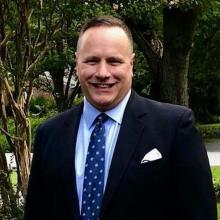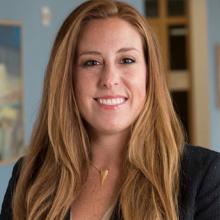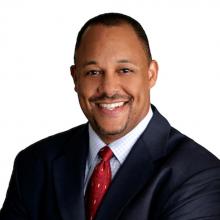Their latest mission: Carey veterans set example of service
A proven commitment to ethics, loyalty, leadership, and innovation
This story was produced for the fall 2018 issue of Carey Business magazine.
By Joan Katherine Cramer
Making the transition from military service to the civilian business world isn’t always easy. There’s the challenge of learning a new language. The armed services employ a distinct vocabulary. So does business. And, at first glance, it might seem there is even a competing ethos. Mission is everything in the military, and ideas such as personal branding, networking, and self-promotion can seem almost ignoble when you have been trained to subsume personal ambition to a larger cause.
But leaders at the Carey Business School see that devotion to a cause beyond self-interest as one of the most powerful qualities veterans bring to the private sector—and to fellow business school students.
“If you look at our mission statement, we want to train, not just first-class business leaders, but ‘exemplary citizens,’” says Kevin Frick, professor of health care economics and vice dean for education at Carey. “That’s very attractive to someone who has served. There’s a lot of ‘me, me, me’ in the world today, and our student veterans can help us revive the idea of civic responsibility, that we are all in this together.”
If you look at our mission statement, we want to train, not just first-class business leaders, but ‘exemplary citizens.”
Kevin Frick, Vice Dean for Education
Thanks to Admissions outreach to veterans, coupled with an array of support services—from financial aid to peer counseling—a record 192 veterans are enrolled at Carey this year. They represent 9 percent of the current enrollment, making Carey one of the most veteran-friendly business schools in the country. About half receive financial support, including tuition and housing, from the United States Department of Veterans Affairs, and when those benefits run out, there is the Yellow Ribbon Program, in which a combination of money from Carey and the VA creates 25 scholarships totaling up to $10,000 a year. (The potential Carey-VA combination for each Yellow Ribbon scholarship will double to $20,000 annually, starting with the 2019-20 academic year.)
“Our student veterans are incredibly driven, practical, and focused,” says Frick. “They value camaraderie and loyalty. They are problem solvers with great leadership skills. Many have had enormous life-and-death responsibilities. We see it as our job to help them capitalize on those strengths and realize their virtually limitless potential as innovators and leaders in the business world.”
Here are three veterans in the Carey community—two students and one alumnus—who have already begun to realize that potential.
Dan Mosqueda
Dan Mosqueda ’19
Part-Time Flexible MBA Program
Air Force Veteran
Just 15 years ago, Lieutenant Colonel Dan Mosqueda was managing the training and deployment of more than 26,000 airmen during Operations Iraqi Freedom and Enduring Freedom — work that ultimately earned him a U.S. Air Force Meritorious Service Medal. Afterward, he became a superstar in the world of space technology as an officer of the Air Force Space Command.
Unlike many veterans, Mosqueda made a seamless transition from military service to the private sector. Last year, he was recruited by SRI International—the research and development powerhouse that first became famous for inventing the computer mouse and interactive computing—to serve in their Washington, D.C., office as manager of federal business development. Before SRI, he served as manager of national security program development at USRA, the Universities Space Research Association, a Columbia, Maryland-based scientific research and advanced-technology company.
So why, at the pinnacle of his career, with a wife and two sons and a more than full-time job that he loves, did Mosqueda decide to go back to school to pursue a business degree? And why Carey?
“Because for years I had been learning on the fly about organizing, about making things work,” he says, “but always with a nagging sense that there was more to know. I spent six years in my last job doing business development, and it was incredibly interesting, but I felt very uncomfortable with certain processes. I didn’t understand, for instance, how we were pricing our work. I had just completed a master’s degree in military studies, but it didn’t help with this stuff, so I got to the point where I just said, ‘I have got to get an MBA.’”
"You don’t have to be able to do accounting, but you need to be able to go into that Monday morning meeting and at least know what they’re talking about so you can ask the right questions.’ I get goosebumps thinking of the impact that had on me.”
Dan Mosqueda ’19
He looked seriously at the University of Chicago and his alma mater, the University of Michigan, where as a member of the class of 1991 he had joined Air Force ROTC and earned a B.A. in Russian and East European studies. But he felt their programs were too rigidly structured to fit into his busy life.
“Then I looked at Carey and the Flexible MBA program and thought, ‘This is nice. I can take some classes online, some in person,’ and it’s been great,” says Mosqueda, who is one of 132 student veterans on the part-time Flex MBA track. “I have a two-hour commute to work on the train and Metro, and I use that time to study and read and write, and, as I go through class after class, those holes I sensed in my knowledge are getting filled. I’m always sitting in class and thinking, ‘Wow. If only I’d known this 15 years ago.’”
Mosqueda says the most difficult classes have, in many ways, been the most rewarding. Microeconomics, statistics, accounting—anything dealing with numbers. This despite the fact that he has been a high-tech savant since high school. He taught himself Lotus 1-2-3, owned one of the first IBM PCs (an expensive, at the time, gift from his parents), and started a business building and selling computers and peripherals while he was in college.
“I’ve always been terrified of math, and here’s where Carey is really great,” he says. “The folks at the Student Success Center—those tutors are good. And patient. I’d be lying if I said I got A’s in those classes, but I passed them, and every day I use the material I learned. One professor kept telling us, ‘You don’t have to be able to do accounting, but you need to be able to go into that Monday morning meeting and at least know what they’re talking about so you can ask the right questions.’ I get goosebumps thinking of the impact that had on me.’”
Despite his extraordinarily busy schedule, Mosqueda has volunteered to represent veterans on Carey’s newly formed Student Advocacy Council. Students who have served in the military have so much to offer the business world and their fellow business students, he says, including a remarkable amount of leadership experience, a penchant for problem solving, an ability to jump quickly from the big picture to a more granular view, and, perhaps most important, a highly developed sense of ethics.
“In the military, core values are everything,” he says. “They’re how you make your decisions. My favorite class by far was in business ethics. It helped me take the ethical thinking you develop in the military and apply it to life in general and the business world in particular.
“Every day you read about shady things going on in the world, and it’s just not right. To me, the Carey credo, ‘Teaching Business with Humanity in Mind,’ means ‘I want to be successful, but I need to balance that with doing the right thing, telling the truth, and caring for the people I work with, the people I work for, and the people who work for me.’”
Erin Ricketts
Erin Ricketts ’19
Global MBA Program
Navy Veteran and Reservist
One day when she was 10 and watching an air show with her parents, Erin Ricketts saw the Blue Angels—the U.S. Navy’s famed flight demonstration squadron—and fell in love. “Even now, whenever I hear them, my heart kind of jumps into my throat,” she says.
Ricketts knew immediately that she wanted to fly, and, further, that she wanted to be an astronaut. A systematic person, she researched the question and discovered that most astronauts were Naval Flight Officers, graduates of the U.S. Naval Academy. Raised in Connecticut in a military family—both of her grandfathers served in the Army, her father was a U.S Army engineer, and her brother is a Navy helicopter pilot—she was very comfortable with the idea of military service. She was also a champion swimmer, with dreams of competing in the Olympics. “Swimming was my way to prove myself to the Naval Academy, and my father’s time in the service put him in a position to earn me a Presidential nomination,” she says.
At the Naval Academy, a shoulder injury cut short her swimming career, but she graduated in 2007 with a degree in engineering technology and quickly realized her dream of becoming a Naval Flight Officer. She was assigned to the P-3 Orion, a four-engine turboprop antisubmarine and maritime surveillance plane developed for the Navy in the 1960s. “It’s an old, smelly aircraft, but it certainly has its benefits tactically,” she says. “We fly about 200 feet off the water. It’s a blast!”
She was trained as a TACCO, or tactical coordinator, who manages the flight crew responsible for tactical operation of the aircraft and its systems. “I was a backseater, specializing in weapon systems, tactics, and communications primarily,” she says. After three years on the P-3 Orion, she became a TACCO instructor, the highest qualification one can earn as a tactical coordinator on the aircraft.
Ricketts was deployed three times—twice in the Middle East and once all over Asia and South America. The deployments lasted six to eight months, but her squadron prepared each time for about a year. “When you spend that much time preparing, it’s wonderful to have that level of confidence in your skills and do what you’ve been practicing together for so long,” she says. “We were eyes in the sky, and I loved it. The camaraderie is incredible. You become lifelong friends.”
"Even working on my resume and translating the story of my Navy experience into language other people can understand has been a major achievement.”
Erin Ricketts '19
When she prepared to resign from active duty, she decided to move to Washington, D.C., and apply to business school. “I had a lot of technical experience, I had a lot of leadership experience, I was fluent in military lingo, but—and this is going to sound clichéd—I didn’t know how to ‘speak business.’”
Still on active duty, she worked in Washington, D.C., at the U.S. Navy’s Office of Women’s Policy, where she reviewed pregnancy and parenthood policies through the lens of diversity and inclusion. “It was wonderful, brainstorming and playing devil’s advocate, encouraging some of the senior leadership in the Navy to see things through the eyes of the younger generations,” she says.
Ricketts says that, in her experience, men in leadership roles, in both the Navy and the culture at large, have become much more aware of ways in which women have been excluded in workplace decision making, and that they are increasingly advocating to include them. “Things have changed dramatically,” she says.
During her final year of active duty, Ricketts jumped at the chance to serve in the Obama White House, providing protocol support for official events. After she left active duty—and just before she entered the Global MBA program at Carey in 2017—she served as a liaison between the Navy and the defense industry on ballistic missile defense systems to learn more about what it might be like to work in the aerospace industry as a civilian.
Now a full-time student, Ricketts says she finds Carey very supportive of veterans. She is a member of the Carey Student Veteran Network, a student-run support and career development group. And as a member of Carey’s student-run Council for Inclusive Excellence, she hopes to continue the work she began in the Navy promoting diversity and inclusion.
Best of all, she is learning the language of business, just as she had hoped. “Even working on my resume and translating the story of my Navy experience into language other people can understand has been a major achievement,” she says.
Ricketts is still a Reservist, attached to a unit based in Stuttgart, Germany, and drills with local members a few times a month out of Andrews Air Force Base in Prince George’s County, Maryland. Her goal is a career in the aerospace industry. As an MBA candidate, her focus is business development and strategy.
“I want to be the executive making strategic long-term decisions,” she says. And she has never given up her astronaut dream, even if it means sending someone else into space. “I want to be the decision maker for a company sending a crew to Mars.”
Tony Wells
Tony Wells ’97
Certificate in Business Administration
Senior Vice President, Marketing, USAA Marines Corps Veteran
It was basketball that inspired Tony Wells to consider military service. A promising forward at Our Lady of Good Counsel, a Catholic high school just outside of Washington, D.C., Wells averaged 12 rebounds per game in his senior year and was recruited by a number of excellent schools. One of them was the U.S. Naval Academy.
“It was a big decision because it’s a nine-year commitment, four years of school and five years of service afterward, but I wanted to play Division I basketball and thought it offered the best balance between academics and athletics,” he says. “My grandfather had served in the Navy before desegregation, so he was very proud of the idea. And the more I learned about it, the more interested I became.”
As a student at the Naval Academy, Wells decided to join the Marine Corps, a branch of the armed services administered by the Navy. “I was really attracted to their hands-on approach to leadership, the focus on being down in the trenches with your unit, the importance of taking care of your Marines.”
After graduating with a degree in physical sciences, he went through the notoriously rigorous training required to become a Marine infantry officer. “That was 30 years ago, and I have since had a great civilian career in marketing, but being an officer of Marines was simply the best job I’ve ever had. The stakes are so high, and the amount of responsibility, of authority, of accountability you have at such a young age is hard to replicate in the private sector,” he says.
"The adaptability that keeps Marines alive on a battlefield is exactly what every company needs to thrive in a rapidly changing world.”
Tony Wells '97
“Plus, there’s something noble about sacrificing for something greater than yourself. A lot of people think military folks do heroic things because we’ve been indoctrinated, but you really do it because of the person on your left, the person on your right, that sense of esprit de corps that’s pretty rare in the civilian world.”
During his time in the Marine Corps, Wells was deployed for six months aboard ship as an infantry platoon commander. “It was a very unique experience to go abroad and represent the U.S. as a force in readiness and to cross-train with all the NATO countries.” He served 5½ years of active duty and 2½ in the Reserves, and during that time the Marines sent him to school to become a public affairs officer. When he got out in 1991, Nissan Motor Corporation hired him as a corporate communications manager.
“I was incredibly lucky,” he says. “For most people, the transition to the civilian workforce is incredibly challenging. Military jobs and skills don’t always have an equivalent in the civilian world. So I couldn’t have been more fortunate.”
In 1996, Nissan sent him to a Minority Leadership Program that the Johns Hopkins School of Professional Studies in Business and Education (Carey’s precursor) offered. He earned a Certificate in Business Administration, and says the program, designed to help young minority managers navigate the business world and see themselves as potential leaders, was a “real turning point, an awakening of my aspirations and the feeling that I could, if I applied myself, rise to a senior management position.”
In the years since, he has held top-level marketing jobs at a number of major corporations, including the Mills Corporation, General Motors, Visa, and, most recently, USAA, which provides millions of military members and their families with insurance, banking, and investment services.
“I’ve been using USAA’s services for years, so it feels like coming home,” he says.
Like most veterans, Wells holds an instant affinity for anyone who has served. He likes to hire veterans and help them with advice, if he can. “There has never been more support for their transition to the private sector, never more respect for their skills and service,” he says. “I still use so much of what I learned in the Marine Corps—the need to focus, yet be flexible, to make decisions on the spot, even if you don’t yet have all the information, to adjust quickly to dynamic situations.
“The adaptability that keeps Marines alive on a battlefield is exactly what every company needs to thrive in a rapidly changing world.”


